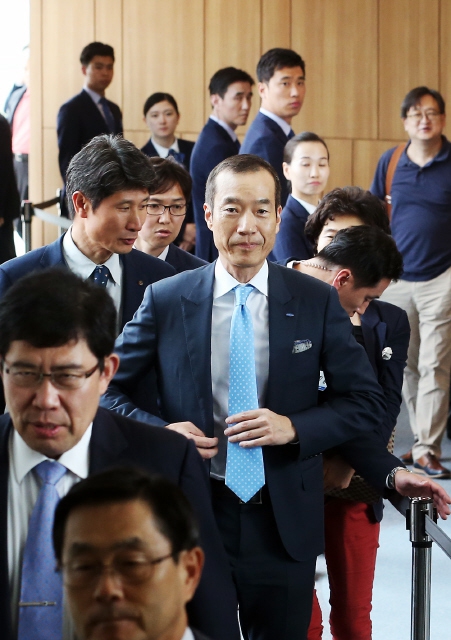 |
|
Samsung Chief Executive Officer and President of Samsung C&T Engineering & Construction Group Choi Chi-hoon leaves an extraordinary general meeting of shareholders for discussing a merger with Cheil Industires in Seoul in Oct. 2015. Samsung C&T Corporation approved its merger with Cheil Industries on the same day. (Hankyoreh archives)
|
Official statement declares Elliott Management’s claims are “groundless”
“The National Pension Service voted on the Samsung merger based on assessments of what would bring about the greatest profit to itself.” This echoes arguments made by the defense teams of former President Park Geun-hye and Samsung Electronics Vice Chairman Lee Jae-yong, who denied prosecutors’ claims that there were backdoor dealings between the Blue House and Samsung behind the scenes of the NPS’ vote. Yet this phrase was presented as part of an official statement from none other than the South Korean government, during a lawsuit. Saying that they “suffered damages in the process of the 2015 Samsung C&T and Cheil Industries merger as a result of unfair actions taken by the South Korean government,” US-based hedge fund Elliott Management filed an 800 billion won (about US$700 mil.) ISD lawsuit against the South Korean government, to which a “government dispute response panel” spanning the Ministries of Economy and Finance; Foreign Affairs; Justice; Trade, Industry and Energy; and Health and Welfare submitted a statement in this vein to the arbitration courts on Aug 13. How could this be possible? On Aug 23, the Justice Ministry, the main authority on the matter, explained on that “We simply pointed out that Elliott’s claims are groundless, while listing the necessary evidence.” However, there has been criticism that this stance was imprudent given that it could affect the currently ongoing 2016 presidential scandal trial. This statement contains the argument that “Even if one were to accede to the lower courts’ ruling, there is no evidence that a problematic merger was brought about by an illicit action implemented and maintained by the South Korean government, or that there was enough shareholder support throughout the course of the merger being passed.” Amid rulings that are somewhat contradictory, it appears that the government is taking a side. In fact, the most serious charge, as well as the most fiercely contested item, of the political scandal trial is the question of whether Park Geun-hye’s Blue House intervened in the Samsung merger in order to aid Samsung Electronics Vice Chairman Lee Jae-yong’s succession of the company. Whether the courts recognize the 43.3 billion won (about US$ 38 mil.) in bribes alleged in the prosecutors’ indictment, either in its entirety or in part, depends on this question. In last November’s appeal trial of former NPS Chairman Moon Hyung-pyo and former Chief Investment Officer Hong Wan-sun, who were charged with abuse of authority, presiding judge Hon. Lee Jae-young of the 10th criminal division at the Seoul High Court made it clear that there were instructions from the Blue House behind former NPS chairman Moon’s illicit intervention in the Samsung merger. On the other hand, the 13th criminal division of the Seoul High Court (presiding judge: Hon. Chung Hyung-sik), which ruled on Vice Chairman Lee’s appeal, concluded, “There was no comprehensive succession plan that was the target of illicit favors.” One lawyer who works in Seoul said that “In an ISD lawsuit, the burden of proof is with the claimant, so it is questionable whether it was necessary for the government to so actively advance an argument using just one side of court rulings.” Another legal expert said, “It’s enough to make one suspect there is a ‘covert hand’ that is trying to sway the trial in Vice Chairman Lee’s favor.” Responding to this in a phone call with the Hankyoreh, a high-ranking Justice Ministry official said, “It seems easy to construe certain phrasings as definitive. We will consider this in the future.” By Kim Yang-jin, staff reporter Please direct comments or questions to [english@hani.co.kr]






